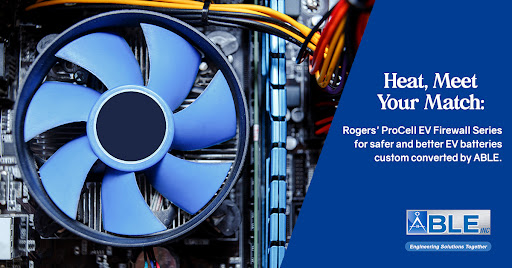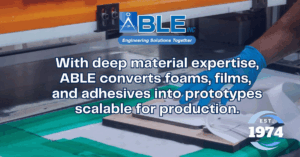Thermal Propagation Protection: Maximizing Safety Without Risking Superb Performance

Vehicles continuously undergo electrification, making thermal propagation management an important industry topic – especially for battery end users and manufacturers. Materials from Rogers help mitigate thermal propagation in batteries that experience temperature rise that’s often associated with thermal runaway.
Because ABLE understands that the safety of consumers is paramount to the industry, we partnered with Rogers Corporation as they develop materials that help designers to prioritize and maximize safety without sacrificing battery performance.
Let’s take a look at how Rogers Corporation addresses thermal propagation protection.
Rogers Corporation: Addressing Thermal Solutions
Rogers Corporation is a proud industry leader in thermal solutions that protect critical systems and electronics. The company provides solutions that are tailored to the client’s design needs by means of cooling materials, heat conduction, and heat storage. This is very apparent in how they handle different problems, including user discomfort and performance throttling.
The company can also provide support to devices or products that require thermal management to maintain operating conditions that will ultimately avoid premature component failure.
Rogers Corporation has several thermal solutions which include the following:
- Active Liquid Cooling
- Heat Conduction
- Thermal Insulation
- Passive Liquid Cooling
- Temperature Protection
- Heat Resistance
Rogers Corporation: Further Explaining Thermal Propagation Protection
The electrification of vehicles is a continuous process that innovates how we use vehicles today. Finding ways to manage thermal propagation is critical in ensuring that both the manufacturer and the end user are aware of the risks that might come from it.
Here are two ways Rogers Corporation addresses this challenge:
Heat Spreading Tape
Rogers Corporation produces materials such as the ProCell EV Firewall series, a multi-layer laminate that works by spreading heat on one side of the material while insulating the other side. It blocks the transmission of particulates that might be present when a battery fails. The ProCell EV Firewall series can be laminated to the PORON polyurethanes, which enhances its performance with ideal curve attributes and gap-filling functionality or can be used independently.
Elastomeric Thermal Barrier
Materials from Rogers Corporation are combined to have the multiple functionalities of ideal curve behavior, gap filling, and vibration management, with thermal runaway protection that’s an all in one, non-composite solution. The ProCell EV Firewall series, in particular, can withstand extremely high temperatures with a multi-step mechanism approach. This makes the material into an effective battery pad that, in turn, makes it an excellent material for cell-to-cell thermal propagation protection.
Product in Focus: Rogers Corporation’s ProCell EV Firewall Series
The Rogers ProCell EV Firewall series showcases a portfolio of products that work to delay the thermal propagation in batteries. These materials can withstand very high temperatures. In addition, the Rogers ProCell EV Firewall product line can also stop thermal runaway in small-scale nail penetration testing.
These materials are offered in a range of thicknesses to support module-to-module and cell-to-cell designs.
The benefits of using the product line are as follows:
- A wide range of thicknesses and compressibility in a variety of designs
- Delays thermal propagation in some battery designs
- Features a thin option that can be integrated into PORON grades and materials
- Compressible options that optimizes battery performance
- All grades are easily converted without debris or dust
The products in the ProCell EV Firewall Series for thermal propagation protection are as follows:
- ProCell EV Firewall 800 & 801: Has a heat capacity of 1.1 J/g °C and a thermal capacity of 1.36 W/m-K. It also delays the rise of temperature even at >1100° F in propane torch testing.
- ProCell EV Firewall PCL-350 & 400: Has thickness that ranges from 1.5mm and 3mm with a medium firmness grade. It’s made of filled silicone elastomeric material.
Rogers Corporation develops materials that prioritizes consumer safety and battery performance. With their expertise in thermal propagation protection, the company continues to have an edge in the industry as they provide cutting edge technology and superb customer support.
Eager to learn more about what Rogers Corporation has to offer in terms of thermal propagation protection? Talk to us at ABLE today and we’ll be more than happy to assist you!
References:
https:// www.rogerscorp.com/applications/thermal-propagation-protection
https:// www.rogerscorp.com/elastomeric-material-solutions/procell-ev-firewall\
https:// www.rogerscorp.com/applications/thermal-solutions






